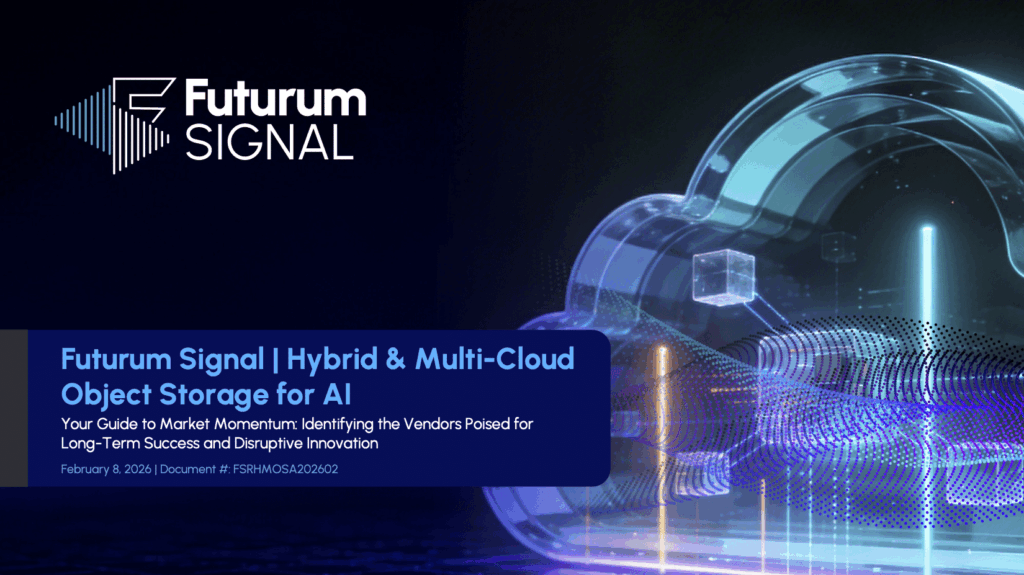The News: Lenovo introduced new ThinkAgile hybrid cloud solutions and ThinkSystem server platforms, along with Lenovo TruScale for Hybrid Cloud, leveraging next-generation Intel Xeon Scalable processors to enhance performance, streamline IT, reduce power consumption, and offer flexible, scalable AI performance as a service, thereby accelerating the AI journey. Read the full press release on the Lenovo website.
Lenovo’s AI-Driven Hybrid Cloud Expansion
Analyst Take: Lenovo’s recent announcement about expanding its hybrid cloud platform for AI, integrating new ThinkAgile hyperconverged solutions and ThinkSystem servers, marks a significant stride in cloud deployment, hybrid connectivity, and AI capabilities. This leap, powered by the latest Intel Xeon Scalable processors, is not just a technological advancement; it is a strategic move toward a more dynamic and inclusive AI ecosystem. This analysis dissects Lenovo’s approach and the announcements implications for the AI and cloud computing landscape.
AI for All: Lenovo’s Vision
Lenovo’s vision of AI for All is underpinned by its $1 billion investment in AI innovation, announced at Lenovo Tech World earlier in the year. This approach hinges on the coexistence of public, private, and personal foundation models. What stands out is Lenovo’s commitment to data security and user privacy, with AI operations tailored to individual users or enterprise proprietary data, ensuring information remains confidential and not part of open training datasets. This strategy not only enhances security but also leads to more potent, personalized AI outcomes.
Enhanced AI Performance and Cloud Agility
The new Lenovo ThinkAgile hybrid cloud solutions are engineered to enhance AI performance, offering more compute power and faster memory. What distinguishes these solutions is their design to boost AI performance while maintaining cloud agility. The integration of Lenovo Professional Services for AI and TruScale as-a-service offerings aids customers in simplifying IT and accelerating AI adoption. These services, especially TruScale’s pay-for-what-you-use model, provide a cost-effective, scalable approach to AI deployment.
Kamran Amini, VP and GM at Lenovo Infrastructure Solutions Group, who I spoke with a couple of times this week, emphasizes that these solutions bring data center-level compute to the source of business data, with up to 21% better performance. This improvement is crucial for reducing IT footprint, achieving greater ROI, and delivering enhanced business outcomes. The design supports current AI, virtualization, and multi-cloud workloads, increasing energy efficiency and agility.
The 5th Gen Intel Xeon Scalable processors in the new ThinkAgile and ThinkSystem servers offer built-in AI acceleration with Intel’s AMX technology. This feature supports AI inferencing and training on large-scale models, enhancing efficiency. The portfolio’s open architecture, superior reliability, and end-to-end security facilitate diverse hybrid multi-cloud workloads for companies of various sizes.
AI for Hybrid Cloud and Server Innovation
Lenovo’s launch of 17 new servers is notable. These servers, optimized for AI and compatible with existing infrastructure, are designed for rapid deployment and handling complex workloads. The ThinkAgile integrated hybrid cloud solutions, compatible with leading cloud software, demonstrate Lenovo’s commitment to reducing backup and recovery times and deployment efforts.
Also noteworthy is Lenovo’s partnership with Intel and its incorporation of the new CPU across its ThinkSystem portfolio underscore its commitment to delivering cutting-edge technology. The multi-node server capabilities with the SD530 V3, SD550 V3, and SD650-N V3, powered by 5th Generation Intel Xeon Scalable processors, highlight Lenovo’s focus on maximizing processing power. Moreover, Lenovo Neptune’s holistic approach to liquid cooling is a significant advancement in tackling system overheating, ensuring efficient performance.
The robust Lenovo ThinkSystem SR650 V3 and SR630 V3 rack servers offer flexible configurations optimized for AI workloads. The inclusion of Intel Xeon E-2400 processors in the SR250 V3 rack server and ST250 V3 tower server caters to the needs of multi-site locations, including branch offices and retail.
Unleashing the Power of AI as-a-Service
Lenovo TruScale, an innovative service model, encompasses a wide spectrum of Lenovo’s product range, extending from the compact Motorola handsets to sophisticated personal computers and reaching up to their most extensive Hyperconverged Infrastructure (HCI) solutions. This comprehensive coverage allows Lenovo to offer a seamless and integrated service experience, bridging mobile technology with powerful computing and advanced data center solutions. TruScale’s versatility demonstrates Lenovo’s commitment to providing scalable and adaptable services that cater to the diverse needs of users, from everyday mobile communications to complex, large-scale IT infrastructure demands.
Lenovo TruScale for Hybrid Cloud and the new TruScale Hybrid Cloud for Edge represent a significant leap in AI applications, offering as-a-service and fully managed on-premises data center solutions. These solutions provide the agility and control necessary for businesses to adapt to changing needs.
Lenovo Services: Accelerating AI Implementation
What is not widely known in the market is that clients can engage with Lenovo to access cutting-edge, tailored services that kickstart their AI journey, leveraging Lenovo’s expertise in advanced technologies and solutions. Lenovo’s approach involves a comprehensive analysis of client needs, followed by the deployment of state-of-the-art AI tools and infrastructure, ensuring a practical and efficient initiation into the world of AI.
As part of the launch focus, Lenovo is stressing its Professional Services for AI, leveraging its global expertise, to offer a single-vendor solution guiding organizations through effective IT deployments. This service approach will be vital for clients looking to harness AI for rapid, impactful business outcomes and navigate the complexity of the solution landscape.
Looking Ahead
Lenovo’s unique positioning as a hybrid cloud provider stems from its dual role in offering both on-premises infrastructure solutions and services to tier-one hyperscale cloud providers. This dual capability allows Lenovo to seamlessly integrate and optimize cloud environments, bridging the gap between local data management and large-scale cloud computing needs. Furthermore, Lenovo’s experience in catering to the complex requirements of hyperscale providers equips them with advanced insights and technological capabilities, enabling them to deliver robust, scalable, and efficient hybrid cloud solutions to a wide range of clients.
Lenovo’s expansion into AI-driven hybrid cloud solutions represents a significant step in the technology industry. It is not just about technological advancement; it is about making AI accessible and secure for all, with a keen focus on user privacy and data security. Lenovo’s strategy is a blend of innovation and strategic partnerships.
Disclosure: The Futurum Group is a research and advisory firm that engages or has engaged in research, analysis, and advisory services with many technology companies, including those mentioned in this article. The author does not hold any equity positions with any company mentioned in this article.
Analysis and opinions expressed herein are specific to the analyst individually and data and other information that might have been provided for validation, not those of The Futurum Group as a whole.
Other Insights from The Futurum Group:
Lenovo’s AI Milestone: Updates, Announcements, and New AI Capabilities Revealed
Lenovo Q1FY24: Service-Led Solutions and AI Are Primary Growth Vectors
Author Information
Steven engages with the world’s largest technology brands to explore new operating models and how they drive innovation and competitive edge.







